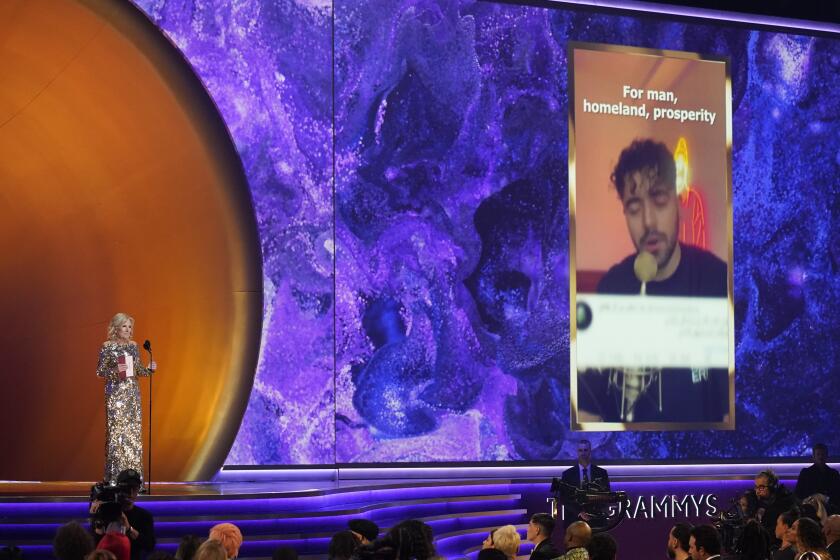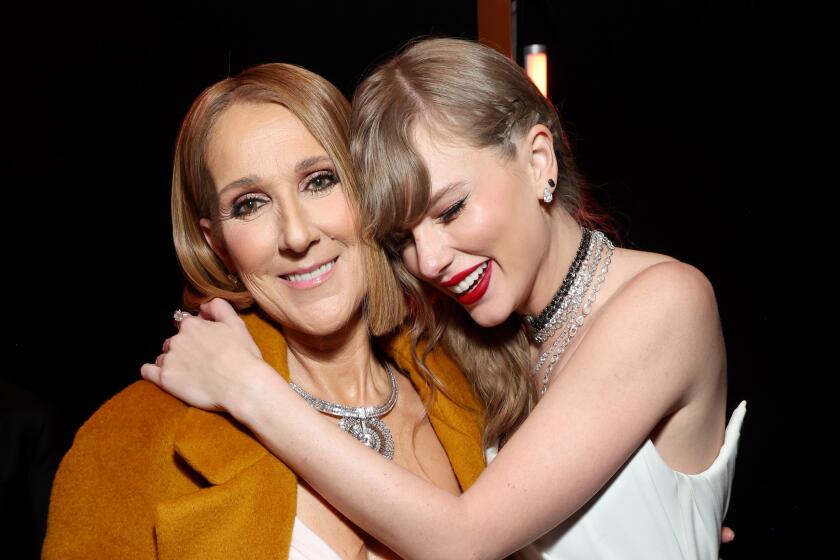It’s True: Milli Vanilli Didn’t Sing : Pop music: The duo could be stripped of its Grammy after admitting it lip-synced the best-selling ‘Girl You Know It’s True.’
Milli Vanilli’s Rob Pilatus admitted Thursday in Los Angeles that neither he nor partner Fab Morvan sang a note on the duo’s multimillion-selling 1988 album “Girl You Know It’s True.”
Pilatus’ admission came after the pair was fired Wednesday by their German producer Frank Farian and after officials at the National Academy of Recording Arts and Sciences said that they may review the group’s 1989 Grammy as best new artist. Milli Vanilli could lose the award, an unprecedented action.
This week’s rapid-fire string of revelations caps several months of behind-the-scenes tensions between the performers and the producer, probably ending one of the most successful performing and recording teams of the video era in pop music.
“I feel like a mosquito being squeezed,” Pilatus told The Times in a phone interview. “The last two years of our lives have been a total nightmare. We’ve had to lie to everybody. We are true singers but that maniac Frank Farian would never allow us to express ourselves.”
Farian, the studio whiz who conceived and created the group’s 7-million-selling album and owner of the Milli Vanilli name, fired Pilatus and Morvan at a press conference in Munich on Wednesday in which he also announced that the pair didn’t sing on the record.
According to NARAS president Mike Greene, Pilatus’ admission will lead to a review of whether the photogenic duo deserved to win the 1989 best new artist Grammy.
“The people who serve on the awards and nominations committee do not take very kindly to being shucked and jived about something like this,” Greene said. “If it were to turn out that someone had been given improper credit on a record and was given a Grammy for something they did not do, we would certainly recommend that the matter be reviewed by the trustees.”
No artist in the history of the Grammys has ever been charged with such allegations, Greene said.
Farian failed to return numerous phone calls but, according to the Associated Press, he said at the news conference that he was forced to go public with the revelations when Pilatus and Morvan demanded to sing on the follow-up to “Girl You Know It’s True.”
“I said, ‘No. I don’t go for that.’ Sure, they have a voice, but that’s not really what I want to use on my records,” Farian was quoted as saying.
At the press conference, Farian said the idea to hire Pilatus and Morvan as front men for the band came to him when the two arrived at his studio in Germany shortly after the recording of “Girl You Know It’s True.”
Several sources close to the situation said that Pilatus and Morvan planned to split with Farian in March when their contract expires and that frictions mounting as a result of their demands may have forced Farian’s preemptive strike. Plans have been canceled for the new Milli Vanilli album, set to be released in January and the duo’s 1991 tour.
“We were afraid for two years that this day would come,” Pilatus said. “We’ve cried about it sometimes, that the secret might come out. But deep inside, we wanted it to happen. I’m happy now that I can talk to our fans about it. We won’t let them down. I swear we will soon have an album out with our own voices on it which will prove our talent.”
Todd Headlee, who represented Milli Vanilli for the management company of Gallin Morey Associates from August, 1988, through August, 1989, said anybody who ever “worked closely with Milli Vanilli has known from the get-go that these guys do not sing their own material.”
He added Thursday: “When I came on board, every record company official at Arista and BMG knew it. Everybody in the management company knew it. That’s why most of their employees are forced to sign a confidential clause binding them to stay silent.”
But Arista executive vice president Roy Lott said Thursday that his company was never aware of the cover-up.
“There is no way that anyone ever could have known whether they sang or not,” Lott said in a phone interview from New York. “We are merely a distributor of their records in the United States. No one from Arista was ever in the studio when they recorded it. Rob and Fab and Frank assured us that they sang on the record.”
Lott said that the label is unconcerned about the revelation and plans to distribute Farian’s new album. Lott has heard some of the record already, and he said “Frank has my full support.”
Farian supports Lott’s position.
“The record company never knew that. I never told them anything,” the German producer said at the press conference. “Later on, after the record was out, there were some people who raised some questions.”
As soon as Milli Vanilli began doing live shows in 1988, questions were indeed raised about whether they were really singing on stage. Many critics and fans thought it was clear that they weren’t. Eventually, the questions broadened as rumors surfaced that they hadn’t even sung on the album.
So, who did sing on the international best-seller?
Several sources have suggested that one of the voices belonged to Dallas native Charles Shaw.
Shaw said that he sang on the record in an interview last November with Newsday, but later retracted the remarks.
Reached by phone Thursday in Munich, Shaw was still reluctant to discuss the Milli Vanilli situation.
“Once you hear me sing and then you have the Milli Vanilli record in your hand, even if I told you it wasn’t me singing, you wouldn’t believe me,” Shaw said.
“Do I resent that Milli Vanilli made so much money and all I got was studio fee?” Shaw asked rhetorically. “When it first happened, you wake up and you see millions running through your head, In the beginning I was very very upset because of the way things happened. But I put it to the side and at the present moment I plan to succeed on my own.”
Several sources claim that tensions developed between the duo and Farian as early the summer of 1988--as soon as the record became a hit. At first the issue was money, Headlee said, and the contract was renegotiated three times.
By last January, however, another issue was placed on the table by the duo: They demanded to sing on the follow-up album.
“They began fighting for was the right to sing on their next album, but Frank Farian denied them the right,” Headlee said. “They were tired of the Arsenio Hall jokes, tired of everybody calling them puppets, tired of not being taken seriously. They believe their talents are being ignored.”
“He blackmailed us from the start,” Pilatus said. “He would not allow us to enter the studio. Then he said the new album was already cut with other singers and it was too late. So we forced the issue. He’s a white German guy who has a big complex about black artists. He did it with Boney M and he did it with us. He’s a control freak.”
Moran and Pilatus first hooked up with Farian in Germany around 1986, when Farian apparently heard an album they had recoreded for a small independent label. They signed their contract with him in 1987.
Farian’s last U.S. success was in the mid-’70s, when he created the million selling disco act Boney M. Farian sang solo on Boney M.’s first album but after the record became a hit he hired four models from the West Indies to front the touring band.
He apparently saw an opportunity to repat that successful formula once he met Moran and Pilatus.
Moran, 24, was born in the Caribbean island of Gaudeloupe and raised in Paris. Son of a German mother and American soldier, Pilatus, also 24, was adopted by a German couple and raised in Germany.
Though he dabbled in modeling and deejaying, Pilatus’ speciality was break-dancing. He was good enough to get invited to an international competition in 1984 in New York. During a short trip to Los Angeles that year he met Morvan, who was in town for a dance seminar at a disco. A former gymnast who injured a vertebrae in a 1983 trampoline accident, Morvan took up dancing as therapy and turned into a club-crawling dance master.
That Los Angeles meeting set the stage for the pair to hook up again in Munich, where they decided to work together as background singers. After adopting the name Milli Vanilli--which they say means positive energy in Turkish--the pair recorded an album for a small German label that sold just a few thousand.
The key to their success was catching the ear of Farian, who needed frontmen for an album he wanted to record. Farian figured he could use the handsome pair to market some ‘70s Euro-disco material, updated with rap and high-tech pop. He produced and wrote most of the material on the German album, “All or Nothing,” which featured the single “Girl You Know it’s True.”
Because the single was a big hit in Germany, Milli Vanilli attracted the attention of Arista Records, which was considering releasing the some of the duo’s records in America.
Davis dumped four of the tracks from the German album, ordered remixes of others and added some new songs, including the Isley Brothers’ oldie “It’s Your Thing” and the ballad “Blame it on the Rain.” Arista released the revamped album, “Girl You Know it’s True,” in February of last year. The single of the title song went to No. 1 in April, 1989.
Times staff writer Dennis Hunt contributed to this article.
More to Read
The biggest entertainment stories
Get our big stories about Hollywood, film, television, music, arts, culture and more right in your inbox as soon as they publish.
You may occasionally receive promotional content from the Los Angeles Times.






